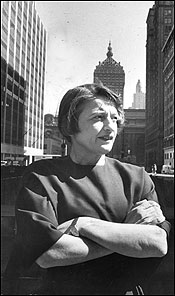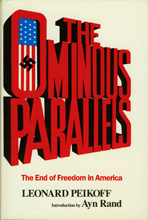

After that second tower crumbled, at least one thing was for certain: We all knew that Leonard Peikoff was going to say BOMB! -- and that the opinions of other laissez fairists would be somewhat less predictable.
Foreign policy may well have been one of the most divisive of the issues that led the libertarian colony to declare its independence from official Objectivism, the mother movement, in the early Seventies. Under the leadership of Murray Rothbard, Roy Childs, Jr., Libertarian Review, and the CATO-underwritten (and often leftist-written) Inquiry, the new movement came to adopt what National Review staffer Ernest van den Haag, in a cover story detailing the irreconcilability of libertarianism and conservatism, characterized as "extreme leftist positions. Even on such issues as the history of the Cold War, or the spying of Alger Hiss, the libertarian position is indistinguishable from the Communist position." In contrast, the rump Objectivists sped off in the opposite direction. By the Eighties, every Bill Buckley editorial was seen and raised, as Peikoff and Peter Schwartz out-righted the rightists. President Reagan was seen as soft on Bolshevism ("too appeasing of Russia"), while Senate hawk Malcolm Wallop's The Arms Control Delusion was criticized by Second Renaissance Books for not "rejecting all forms of arms control on principle." They even purchased an ad in The New York Times declaring that the Ayatollah's death threats against American booksellers (the Satanic Verses controversy) should be met with military force against Iran. And at a time when ice queen Jeanne Kirkpatrick herself was admitting that the Cold War was "very nearly" over, Schwartz informed the Free World that "the Soviets -- both the people and their dictators -- remain firmly committed to the principles of Communism" and the concomitant expansionism.

There was a period in our history when the anti-statist "right" stood united against the foreign interventionism of Progressives and New Dealers. But that period came to an end. By 1975, Ayn Rand could write:
Observe the double-standard switch of the anti-concept of "isolationism." The same intellectual groups (and even some of the same aging individuals) who coined that anti-concept in World War II -- and used it to denounce any patriotic opponent of America's self-immolation -- the same groups who screamed that it was our duty to save the world (when the enemy was Germany or Italy or fascism) are now rabid isolationists who denounce any U.S. concern with countries fighting for freedom, when the enemy is communism and Soviet Russia.
She had evidently failed to recognize that the converse was equally true -- i.e., that the "same aging individuals" who were militantly indifferent to the Nazi conquest of Europe were now militarily obsessed with the Communist conquest of "the world."
What had happened to cause this turnabout? It's an interesting question, but a more important one would be to inquire about -- beyond the situation at any given moment -- the broad moral principles that these players bring to any foreign policy decision-making. Rothbard, for one, claimed that the ideal of "peaceful coexistence" was "the only proper and principled foreign policy" for libertarians. Schwartz, however, didn't buy it for a minute:
Their hostility toward America and their whitewashing of Russia, their condemnation of the overthrow of the communist government in Grenada and their praise for the Sandinista government in Nicaragua, their opposition to Israel and their support for the PLO -- are all manifestations of Libertarianism's deeper roots in nihilism.
By that last line, Schwartz meant what he believed was the lack of a comprehensive philosophy (such as, of course, Objectivism) behind the libertarian advocacy of non-coercion. But what, curious minds will ask, were the basic values that animated all those editorials of The Intellectual Activist? What, precisely, are the "deeper roots" of Objectivist foreign policy?
Under Foreign Policy in The Ayn Rand Lexicon, unquestionably the most authoritative source, we find this answer:
![]()
We need a policy based on long-range principles, i.e., ... a policy explicitly and proudly dedicated to the defense of America's rights and national self-interests, repudiating foreign aid and all forms of international self-immolation.
There you have it: "America's rights" and "national self-interests" -- the essentials, the "roots," of Objectivist foreign policy.* Let us consider each.
First, the second. Almost twenty years after Rand introduced her readers to the concept of "national self-interest," Schwartz provided his readers with an elaboration:
Foreign policy is the advancement of America's interests in the international sphere. It is an egoistic pursuit, in that it demands that the United States, in dealing with other nations, act for its own benefit. It requires that America's self-interest be the yardstick by which the appropriateness of any action is gauged. But that is clearly not possible if self-interest is regarded as a moral evil. This country's true interests cannot be achieved if self-sacrifice -- the renunciation of one's values -- is a virtue. If the U.S. is obliged to use its wealth, power and ideas to serve, not its own ends, but those of the poor, the weak and the irrational, then self-destruction rather than self-protection becomes the unavoidable consequence of our foreign policy.
Articulate, emphatic, and to the point. So, too, from Peikoff's The Ominous Parallels, is this:

Because Hitler demands sacrifice in behalf of the German nation rather than for the world as a whole, some commentators have described Nazism as a form of egoism, so-called "national egoism." This phrase is a contradiction in terms; the concept of egoism is not applicable to collectives, whether national or international. "Egoism" designates an ethical theory, and ethics defines values to guide an individual's choices and actions ... Such a theory [as "national egoism"] is the opposite of egoism.
The conflict is clear: Objectivist Schwartz is saying A, while Objectivist Peikoff is saying non-A. "Egoism" means "self-interest." Both men are discussing the same idea, one unequivocally advocating it as a valid moral principle, the other unequivocally rejecting it as a dangerous oxymoron. It's either-or. If Schwartz is right, then Peikoff is wrong. But if Peikoff is right, then "national self-interest" -- to say nothing of "international self-immolation" -- is a concept without content and without value. Intriguingly, this very conflict existed within Rand herself. For while the Rand of 1967 thought "national self-interest" a principle worthy to guide the votes of congressmen, the Rand of 1962 did not:
So long as a concept such as "the public interest" (or the "social" or "national" or "international" interest) is regarded as a valid principle to guide legislation -- [statist] lobbies and pressure groups will necessarily continue to exist.
And what about the other pillar of Objectivist foreign policy, viz., "America's rights"? Exactly what are "national rights"? According to at least one statement by Rand, the answer is: nonexistent. To wit:
Since only an individual man can possess rights, the expression "individual rights" is a redundancy (which one has to use for purposes of clarification in today's intellectual chaos). But the expression "collective rights" is a contradiction in terms.
Therefore, just as "the concept of egoism is not applicable to collectives," so, too, for the concept of rights. Just as there are no "national self-interests," so there are no "national rights." Each is "a contradiction in terms" -- there is no "national self," no "national individual." With this approach, Rand parallels Peikoff and contradicts Schwartz -- and herself. For she then again insists that there is indeed an "issue of national rights."** But consider her explanation:

A nation, like any other group, is only a number of individuals and can have no rights other than the rights of its individual citizens. A free nation -- a nation that recognizes, respects and protects the individual rights of its citizens -- has a right to its territorial integrity, its social system, and its form of government. The government of such a nation is not the ruler, but the servant or the agent of its citizens and has no rights other than the rights delegated to it by the citizens for a specific, delimited task (the task of protecting them from physical force, derived from their right of self-defense).The citizens of a free nation may disagree about the specific legal procedures or methods of implementing their rights (which is a complex problem, the province of political science and the philosophy of law), but they agree on the basic principle to be implemented: the principle of individual rights.
Well, there it is again: "the principle of individual rights." So then why speak of national rights? Why speak of national self-interests?
Of course, this presumption could be wrong. In any case, the Objectivists are without one clear and consistent "line" on foreign policy principles, which places them in the same glass house in which they've put libertarians. At this point, reason demands that all within stop throwing stones... and start checking their premises.

* As an example of how she applied these formulations to real-life considerations:
Dictatorship nations are outlaws. Any free nation had the right to invade Nazi Germany and, today, has the right to invade Soviet Russia, Cuba or any other slave pen. Whether a free nation chooses to do so or not is a matter of its own self-interest, not of respect for the nonexistent "rights" of gang rulers. It is not a free nation's duty to liberate other nations at the price of self-sacrifice, but a free nation has the right to do it, when and if it so chooses.
** In this essay ("Collectivized 'Rights'"), she condemns liberals for both attacking (previously) and invoking (currently) "national rights."